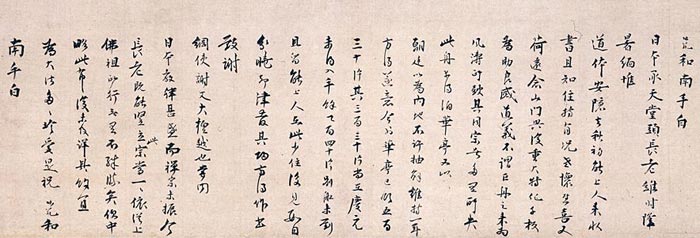Wuzhen Normal School (1179-1249) was a famous normal school with the name Wuzhen. His common surname was Yong, and he was from Zitong, Sichuan (administrated by Zitong County, Mianzhou). When he was nine years old, he became a monk in Yinping Daoqin. In the fifth year of Shaoxi (1194), he received the full realm. In the first year of Qingyuan (1196), he lived in Zhengfa Temple in Chengdu for summer (6). At the age of 20, he was educated by Shirui, a master of Xiuyan in Wangshan. At that time, there was Buddha Zhao Deguang (a monk from the Linji Sect of the Song Dynasty, the Mahahui Sect) living in the east nunnery. Kongsou Zongyin was seated separately. The teacher was poor and could not afford to shave his head, so people at that time often called him "Aconite". Later, he went to Lingyin Temple in Hangzhou and paid a visit to Songyuan Chongyue (a monk of the Yangqi sect of the Linji Sect in the Song Dynasty). He traveled to and from Nanshan and stayed there for six years. I also heard that Po'an's ancestors (monks from the Yangqi sect of the Linji sect in the Song Dynasty) lived in Xihua Xiufeng, Suzhou, and went there to stay. Soon, he went to Huazang Temple in Changzhou (now part of Jiangsu) to teach Zongyan and stayed there for three years before returning to Lingyin. Zhang Zi, the minister, founded the Guanghui Temple and invited the ancestors of Po'an to be the abbot. Shifan also served there for three years and followed him to climb Jingshan Mountain. When the ancestor of Po'an was about to pass away, he paid tribute to his master Xianjie (a monk of the Yangqi sect of Linji Sect in the Song Dynasty). In the fifth year of Shaoding (1232), he was ordered to live in Jingshan. The following year, he went to Ciming Hall to preach. Lizong of the Song Dynasty was deeply moved and gave him the title of "Fojian Zen Master" and silver silk as a means of repairing Jingshan Temple. On March 15, the ninth year of Chunyou (1249), he left more than ten kinds of writings and died three days later. There are five volumes of "Quotations of Zen Master Wuzhun Shifan" and one volume of "Quotations of Zen Master Wuzhun". (Volume 35 of "Xuzhuan Denglu", Volume 8 of "Biography of Eminent Monks of the Ming Dynasty")
Wu Zhunshi is a famous eminent monk in the Southern Song Dynasty. The founder of Tofukuji Temple in Kyoto, Japan (one of the five mountains in Kyoto, the headquarters of the Rinzai sect Tofukuji sect) Enji Bengen (Shoichi Kokushi, 1202-1280) is also a disciple of him. Wuzhun Shifan was a representative figure in Sino-Japanese Buddhist exchanges in the Song Dynasty. He made outstanding contributions and had a profound influence on Sino-Japanese cultural exchanges.

Wuzhun Normal School's "Shakushu", paper, running script, 32.1 x 100.6cm, collected by the Tokyo National Museum, Japan (gift from Matsudaira Naoryo)
The disciples of Mozhun Shihan include famous Japanese monks such as Wuxue Zugen, the founder of Enkakuji Temple in Kamakura, Wuan Puning, the second-generation abbot of Kenchoji Temple, and Enji Benen, the master of the Shoichi Kingdom. Ener Bengen went to the Southern Song Dynasty in the first year of Jiazhen (1235), and received the "Yinke" from the Wuzhen Normal University, and later became the founder of Tofuku Temple in Kyoto (Yinke means that the Zen instructor recognizes the practitioner's enlightenment and allows him to inherit the teachings) proof).
The year after Enji Benen returned to Japan, that is, the second year of Chunyou (1242), the Manjuji Temple where the Wuzhun Normal School was located was hit by the Zhurong disaster. After Enji Benen of Hakata Chengten Temple learned about this, he donated thousands of pieces of wood. as a resource for reconstruction. This is the letter of thanks that Wuzhun Normal University responded to for this purpose. Because of this origin, this piece is also famous as "Bandu ink" (the ink here refers to the calligraphy of Zen monks). In the article, Mozhun Normal University sincerely mentioned that he was delighted that Enji Benen founded Chengtenji Temple, informed him of the amount of wood received and expressed his gratitude. He also hoped that Enji Benen would devote himself to the development of Japanese Zen Buddhism.
This piece was once owned by the famous tea ceremony master Matsue Domain Lord Matsudaira Fumo.








